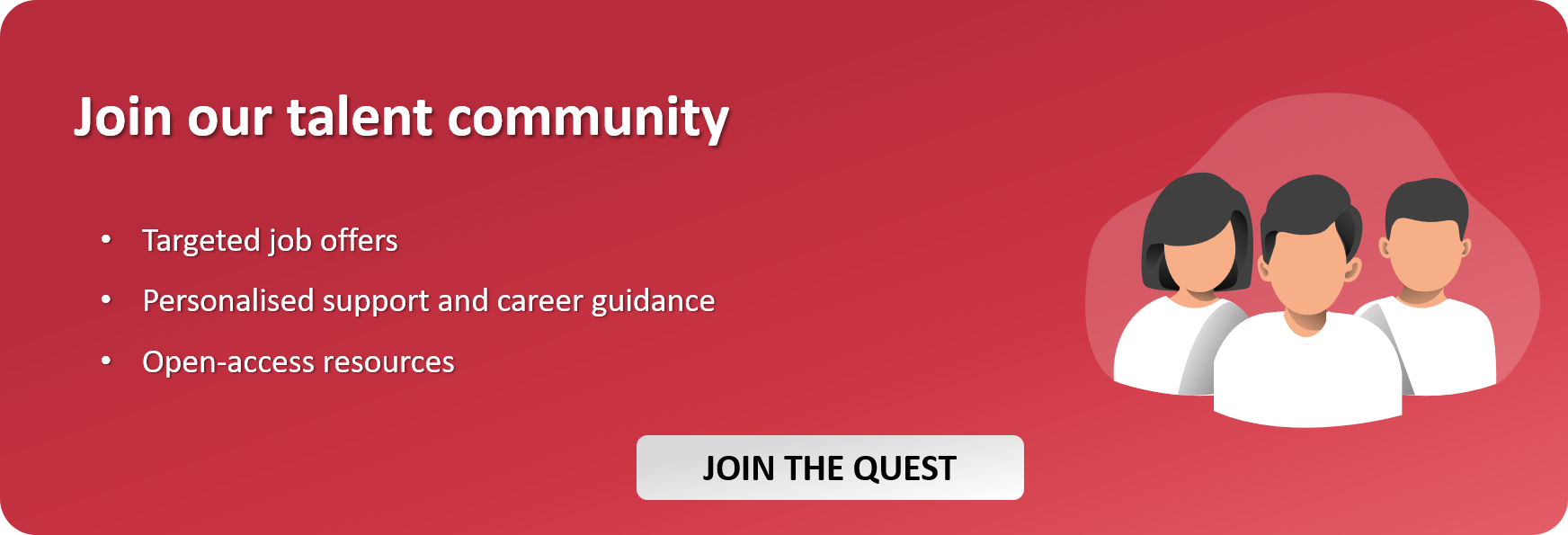The tech industry is constantly evolving, and staying ahead of the game requires having the right in-demand tech skills in your arsenal.
In this article, we will explore the top 10 in-demand tech skills that will set you up for success.
Need advice on how to start or develop your freelance consulting business in tech or IT? Need to start a new permanent or freelance assignment? Join Mindquest and get support from our team of experts.

Top 10 In-Demand Tech Skills
From cutting-edge technologies like quantum computing to essential skills in data privacy. Let’s dive into the in-demand tech skills you need to thrive in the tech industry.
1 Mastering Quantum Computing
Quantum computing is revolutionizing the tech industry, and having expertise in this field it is highly valuable. Skills in quantum algorithms, programming languages, and circuit design are crucial. This because they help solving complex problems in areas like cryptography, drug discovery, and optimization.
Quantum algorithms are different from classical algorithms. Understanding their principles and applications is essential for leveraging the power of quantum computing. Additionally, proficiency in programming languages specific to quantum computing, such as Qiskit and Cirq, is in high demand. These languages allow developers to create and optimize quantum circuits, and they are critical for programming quantum computers.
Another in-demand skill in quantum computing is circuit design. Quantum circuits are the building blocks of quantum algorithms. Mastering circuit design techniques and tools are high demand. This is because businesses and governments seek to harness the full potential of quantum computing.
2 Immersive Experiences with AR/VR
Augmented Reality (AR) and Virtual Reality (VR) technologies are transforming industries like gaming, healthcare, and education. Having skills in AR/VR development, 3D modeling, and user experience (UX) design are in high demand. This because businesses seek to create immersive and interactive experiences for their customers.
AR and VR offer unique opportunities in industries like healthcare. There they are useful for training, simulations, and patient care. For example, AR can overlay virtual information onto real-world environments. Thus allowing surgeons to visualize complex procedures or medical professionals to provide remote assistance. VR can create realistic simulations for medical training, providing a safe and controlled environment for learning.
Then, in the education sector, AR and VR can revolutionize the way students learn by providing immersive and interactive experiences. Imagine exploring ancient civilizations through virtual field trips, or conducting virtual science experiments in a safe and controlled environment. The potential of AR and VR in enhancing learning experiences increases the demand for skilled professionals in AR/VR development, 3D modeling, and UX design.
The entertainment industry has also seen a significant impact from AR and VR technologies. VR gaming has gained traction, providing gamers with truly immersive and interactive experiences. Gaming for mobile apps use AI to allow players to interact with virtual objects in the real world.
You may also be interested in Strategic Intelligence Immersive Experiences
3 Blockchain for Secure Transactions
Blockchain technology is gaining traction across industries. Professionals with skills in blockchain development, smart contracts, and cryptography are a very profitable profile. As businesses explore the potential of blockchain for secure transactions, supply chain management, and digital identity verification, expertise in this field are invaluable.
In addition to the opportunities in blockchain development, there are also emerging roles in blockchain consulting, project management, and regulation. As governments and organizations grapple with the regulatory and legal implications of blockchain technology, professionals with an understanding of the technology and its potential impact can provide valuable guidance. Furthermore, blockchain is still a relatively new field. Ongoing research and development in areas such as scalability and interoperability will continue to create demand. As the use cases for blockchain technology continue to expand, blockchain professionals is among the growing in-demand tech skills.
Also read our Step-by-Step IT Job Hunting Guide
4 Natural Language Processing (NLP) and Conversational AI
NLP and conversational AI technologies are driving advancements in chatbots, virtual assistants, and voice recognition systems. Skills in NLP, machine learning, and conversational AI development are in high demand as businesses look to create intelligent and interactive customer experiences.
The use of NLP and conversational AI technologies goes beyond customer service applications. There are many other use cases for these technologies, such as in healthcare, education, and finance. In healthcare, for example, conversational AI can collect patient data, provide medical advice, and even assist in surgical procedures. In education, NLP it can create personalized learning experiences for students. Then, in finance, conversational AI can provide investment advice or assist in fraud detection. As these technologies continue to evolve and improve, the potential applications are limitless. Creating new and exciting career opportunities for those with the necessary skills.
5 Essential Cybersecurity Skills
With the increasing number of cyber threats, cybersecurity skills will continue to be in high demand. Expertise in threat detection, incident response, risk management, and securing cloud and IoT environments are crucial. This is because businesses prioritize safeguarding their digital assets and data.
As the digital landscape continues to expand, cybersecurity threats are becoming more sophisticated and complex. In response, businesses are increasingly investing in cybersecurity measures to protect themselves from cyber attacks, data breaches, and other threats. This has created a need for cybersecurity professionals who can develop and implement effective security strategies, conduct thorough risk assessments, and respond quickly and efficiently to incidents. In addition, as more organizations move their operations to cloud and IoT environments, there is a growing demand for professionals who can secure these environments and protect against cyber threats. With the continued growth of the digital economy, cybersecurity skills will remain in high demand tech skills for the foreseeable future.
Also read 10 Essential Steps to Ensure Cybersecurity
6 Securing Communication with Quantum Cryptography
The increasing development of quantum computing technology is leading to the emergence of quantum cryptography as a potential solution for secure communication. Skills in quantum cryptography algorithms, protocols, and key distribution are in high demand, as businesses and governments seek to safeguard their sensitive information from quantum-based attacks.
Moreover, the potential for quantum computing to perform complex calculations at unprecedented speeds is making it an area of growing interest and investment. This has resulted in a growing demand for professionals with expertise in various aspects of quantum computing, including software development, algorithm design, and hardware engineering. To stay ahead of the curve in this rapidly evolving field, professionals must develop new and innovative applications for quantum computing. Therefore, the demand for quantum computing and cryptography experts will continue to grow in the years to come.
7 Embracing Cloud-Native Development
Cloud-native development offers several advantages, including faster deployment times, improved scalability, and increased reliability. By leveraging containerization and microservices, cloud-native applications can be broken down into smaller, more manageable components that can be updated and deployed independently. This approach enables businesses to be more agile and responsive to changing market conditions, while also reducing costs and increasing efficiency.
As more businesses adopt cloud-native strategies, the demand for professionals with skills in cloud-native architecture, containerization, and microservices will increase. In addition, expertise in cloud-native technologies such as Kubernetes, Docker, and serverless computing are highly valued as these tools become essential components of the cloud-native stack. The market for cloud-native development skills is expected to remain strong.
Also read Building the dream team for multi-cloud success
8 Ensuring Data Privacy and Compliance
With the increasing focus on data privacy regulations, professionals with skills in data privacy and compliance are in high demand. Expertise in data protection, privacy laws, and compliance frameworks is critical. As businesses strive to maintain compliance and protect sensitive information.
Data privacy and compliance professionals play a critical role in helping businesses navigate the complex landscape of data protection laws. General Data Protection Regulation (GDPR), California Consumer Privacy Act (CCPA), are examples of it. These professionals are responsible for developing and implementing data privacy policies, procedures, and best practices. This to ensure that data is collected, processed, and stored in compliance with applicable laws and regulations.
In addition, professionals in this field need to possess expertise in data protection techniques. Encryption, tokenization, and data masking are examples to ensure that sensitive information is adequately protected from unauthorized access and breaches.
Businesses are under pressure to comply with data privacy regulations to protect their customers’ privacy and maintain their trust. Non-compliance can result in significant financial penalties, reputational damage, and legal liabilities. Therefore, the demand for professionals with skills in data privacy and compliance will continue to rise in the future.
You may also be interested in 5 Simple Steps to Improve Data Security Compliance
9 Edge Computing for Faster Processing
Edge computing is revolutionizing the way data is processed and analyzed in the era of the Internet of Things (IoT). Thus, businesses strive to capitalize on the benefits of processing data closer to the source for faster and more efficient operations.
Edge computing involves moving data processing and analytics closer to the devices or sensors that generate the data, instead of relying on centralized cloud servers. This approach reduces the latency or delay in processing data. Thus enabling real-time decision-making and faster response times. This is critical for applications that require quick and efficient data processing, such as autonomous vehicles, smart cities, and industrial automation.
Professionals with expertise in edge computing architecture have a high value. They are responsible for designing and implementing edge computing solutions that are scalable, secure, and efficient. This involves developing edge computing architectures that optimize data processing, storage, and networking capabilities at the edge. Moreover, integrating edge computing with cloud computing to create hybrid edge-cloud solutions.Professionals with expertise in edge computing architecture have a high value.Professionals with skills in edge computing architecture are highly sought after. They are responsible for designing and implementing edge computing solutions that are scalable, secure, and efficient. This involves developing edge computing architectures that optimize data processing, storage, and networking capabilities at the edge. Moreover, integrating edge computing with cloud computing to create hybrid edge-cloud solutions.
10 Natural Language Processing (NLP) and Conversational AI
Natural Language Processing (NLP) and Conversational AI are rapidly transforming the way businesses interact with their customers. Skills in NLP and conversational AI development are in high demand as businesses seek to create intelligent and interactive customer experiences. This through natural language interfaces, personalized recommendations, and sentiment analysis for improved customer engagement.
NLP is a field of artificial intelligence (AI) that focuses on enabling machines to understand, interpret, and respond to human language. Skills in NLP involve techniques such as text analysis, sentiment analysis, entity recognition, and language generation. These skills are essential to develop chatbots, virtual assistants, and voice recognition systems to provide personalized and intuitive interactions with customers.
Conversational AI, on the other hand, involves the development of AI-powered systems that can carry out conversations with users in a manner that mimics human-like conversations. This includes techniques such as natural language understanding (NLU), dialogue management, and natural language generation (NLG). Skills in conversational AI development are crucial for businesses looking to create sophisticated chatbots. Also, virtual assistants, and voice-based customer service systems that can understand and respond to user queries. They can also provide recommendations, and engage in interactive conversations.
Machine learning also plays a significant role in NLP and conversational AI. Skills in machine learning, including supervised and unsupervised learning, deep learning, and reinforcement learning, are vital for building effective NLP and conversational AI models. Machine learning algorithms can be used to train NLP models for tasks such as sentiment analysis, entity recognition, and language generation, and to train conversational AI models to learn from user interactions and improve their responses over time.
Conclusion
In conclusion, the technology sector is evolving at an incredible pace, and staying abreast of the latest technology skills required is essential for professionals who want to stand out.
Mastering Quantum Computing is critical for professionals looking to leverage the power of quantum mechanics for solving complex problems in various domains. AR/VR Development skills are in high demand as businesses seek to create immersive and interactive experiences in gaming, healthcare, and education. Data Privacy and Compliance expertise is crucial to navigate the increasing focus on data privacy regulations and protect sensitive information. Edge Computing skills is in high demand as businesses adopt strategies to process data in real-time, making it ideal for IoT applications. Lastly, NLP and Conversational AI skills is pivotal in creating intelligent and interactive customer experiences through natural language interfaces, personalized recommendations, and sentiment analysis.
As the tech landscape continues to evolve, professionals with these in-demand tech skills are and are highly sought after. Embracing these in-demand tech skills will open up new opportunities, enhance career prospects, and contribute to the exciting advancements in the tech industry.
Would you like to find out more about our recruitment service for IT consultants? Post your requirements now, or find out more about our job offers directly on our Mindquest platform.






















